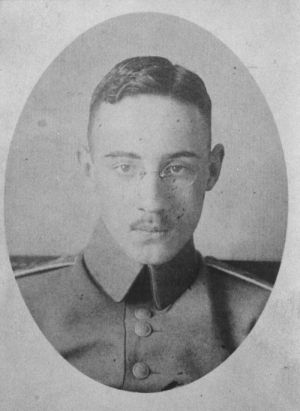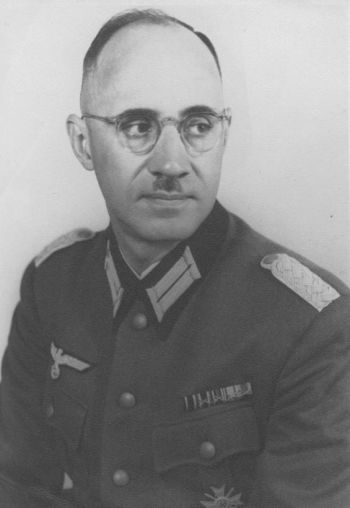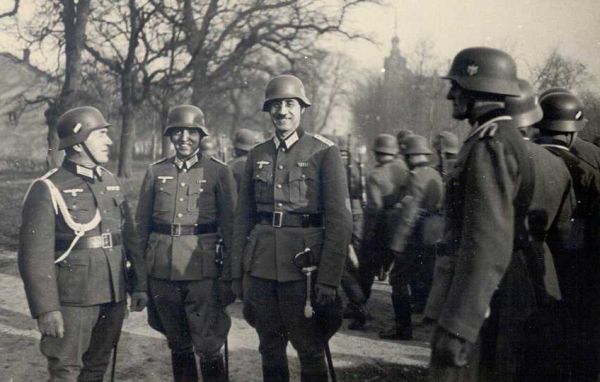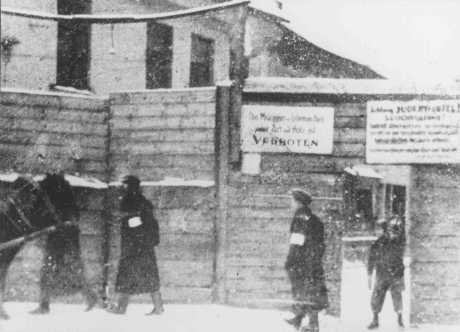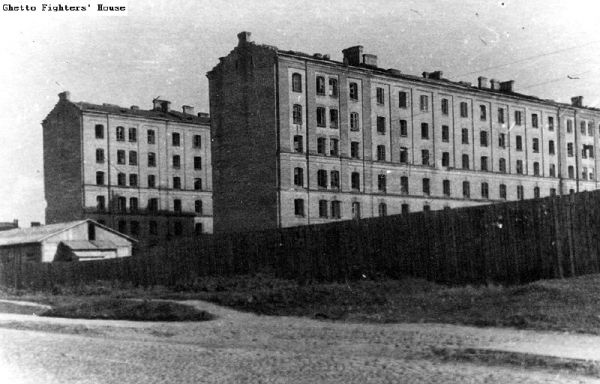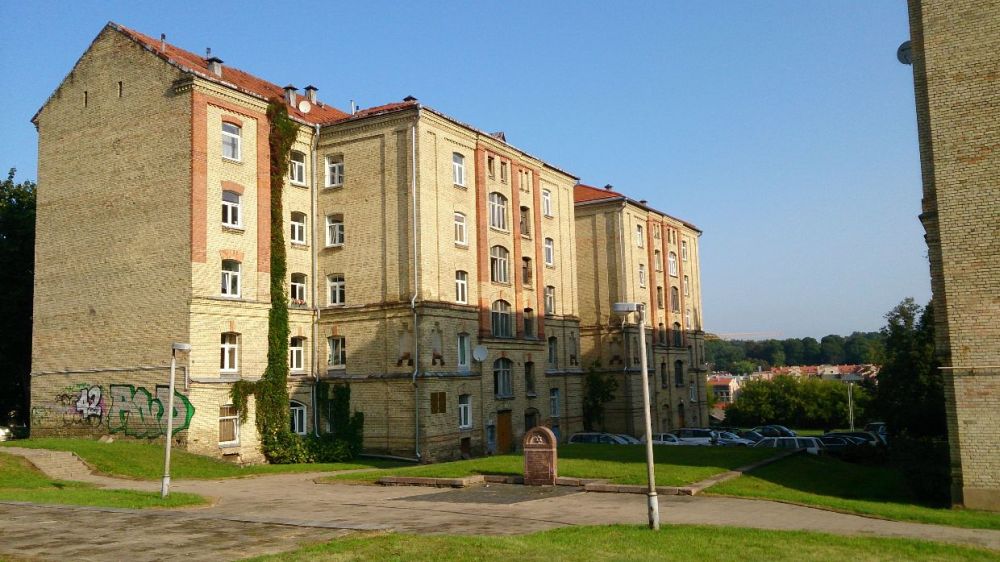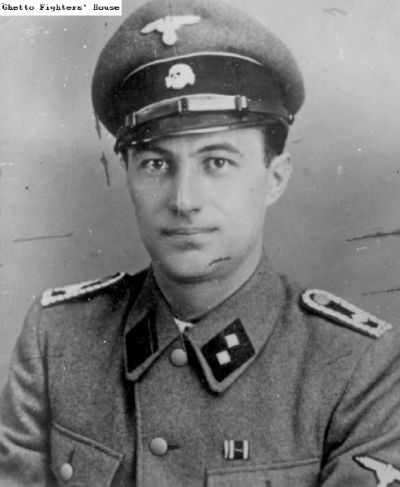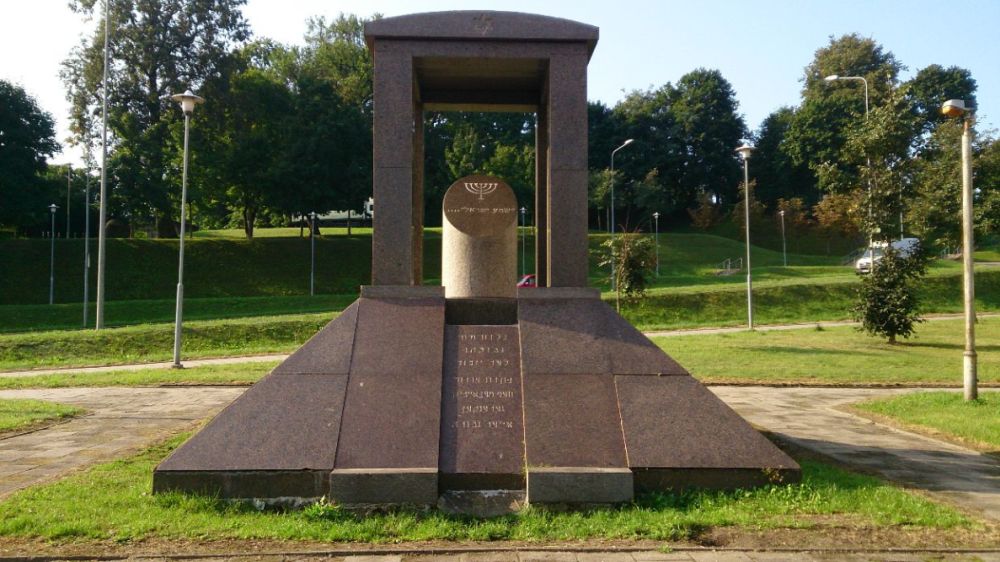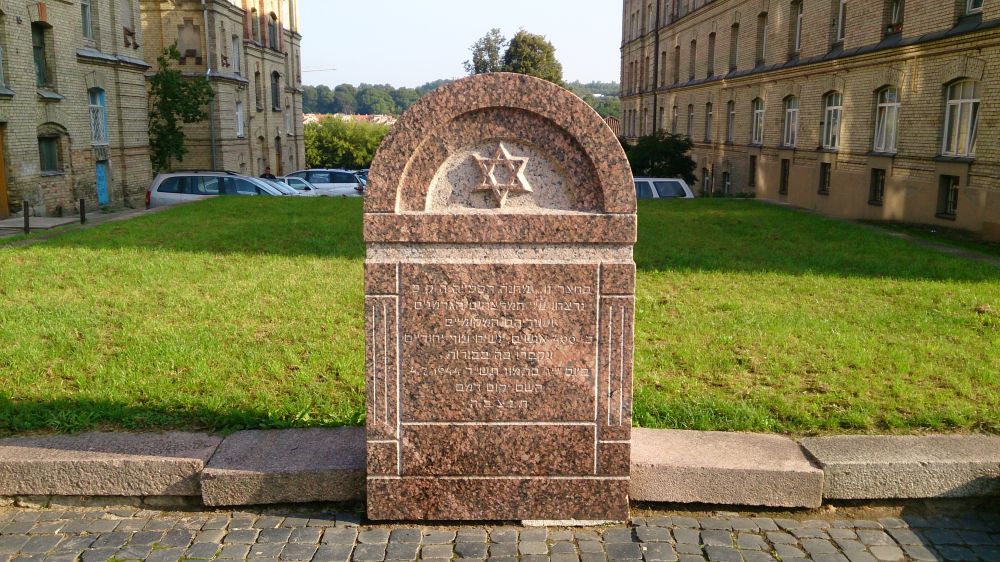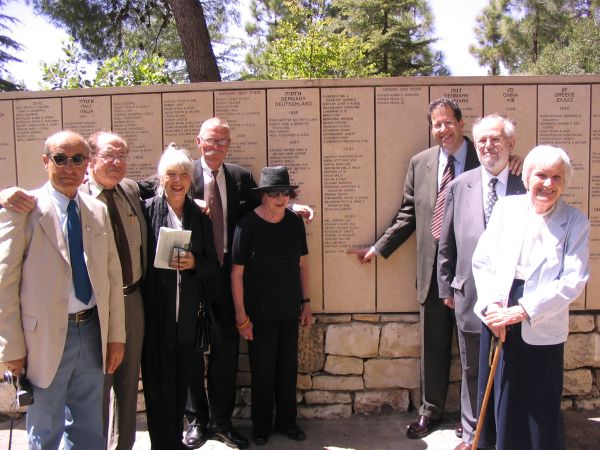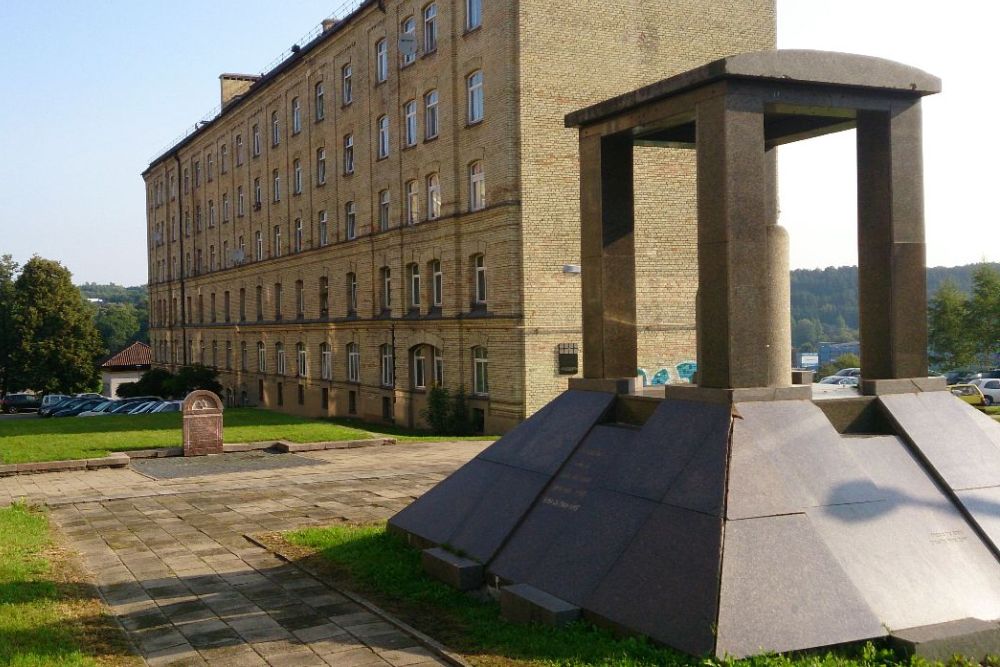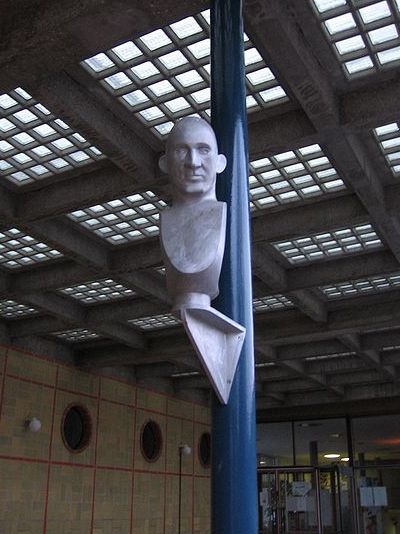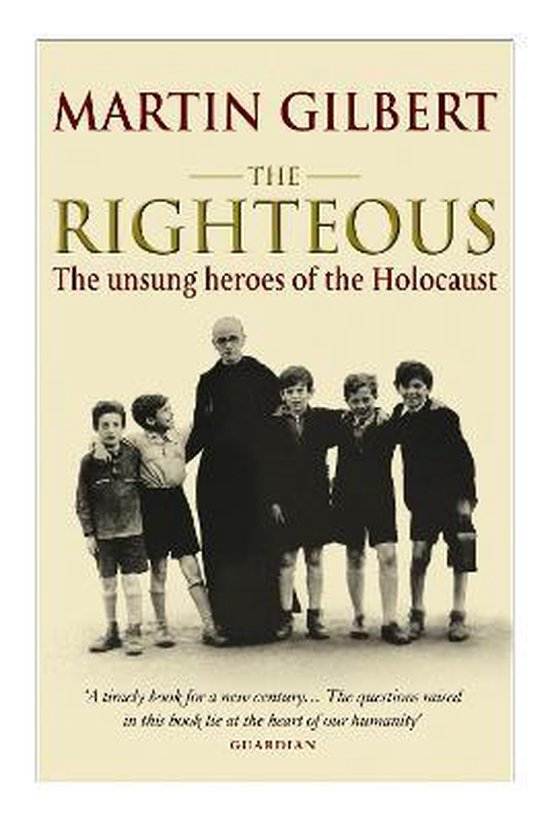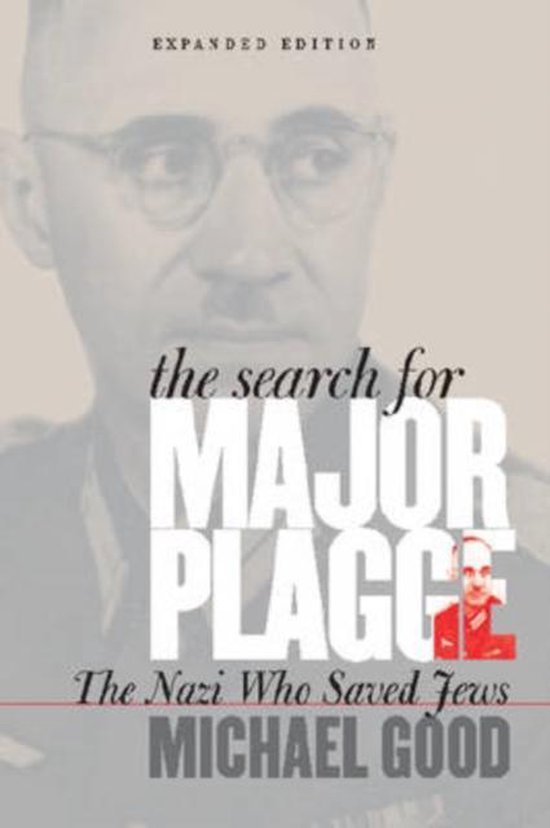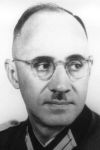Introduction
As a commander of a Wehrmacht unit in Vilnius, which occupied itself with the repair and maintenance of army vehicles, Karl Plagge took over 1,000 Jews in protection. Thanks to him, some 200 of them survived the war. In 2005, he was honored posthumously by Yad Vashem, the Israelian Holocaust Institute. Major Plagge is now known as Righteous among the Peoples, just like Oskar Schindler.
Definitielijst
- Holocaust
- Term for the destruction of European Jewry by the Nazis. Holokauston is the Greek term for a completely burnt sacrifice.
- Jews
- Middle Eastern people with own religion that lived in Palestine. They distinguished themselves by their strong monotheism and the strict observance of the Law and tradition. During World War 2 the Jewish people were ruthlessly persecuted and annihilated by the German Nazis. . An estimated 6,000,000 Jews were exterminated.
- Wehrmacht
- German armed military forces, divided in ground forces, air force and navy.
- Yad Vashem
- Yad Vashem is Israel’s national Holocaust memorial where in addition to Jewish victims and resistance heroes, also non-Jewish helpers of Jews during the World War 2 are being honoured. Those non-Jewish are called the Righteous Among The Nations. Until the mid 90’s trees were planted for these rescuers. In 1996 a special remembrance garden was established displaying all of the names of the helpers. Every year new names are added.
Images
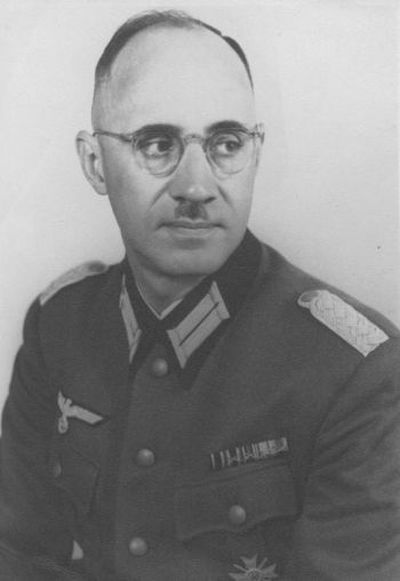 Major Karl Plagge in 1944 Source: Michael Good.
Major Karl Plagge in 1944 Source: Michael Good.Youth, First World War and career in the party
Karl Plagge was born July 10, 1897 in Darmstadt, Germany, the son of an army physician. Karl wanted to follow in his father's footsteps but after secondary school he was drafted into the German army in order to serve in World War One. He saw action at the Western front where he was made a prisoner-of-war 1n 1917. During his 3 year internment in a British PoW camp he contracted polio which disabled his left leg. Back in Germany he wished to enter medical school to become a physician but lack of money forced him to accept a shorter technical study. After having taken additional classes, he started his own pharmaceutical laboratory.
As result of the economic problems following the Stock Exchange Crash of 1929, Plagge had great trouble building an existence for himself. Being a self-conscious German, he was ashamed of the economic malaise and the social unrest which resulted from it. It was the period in which the NSDAP gained popularity. Plagge also felt attracted to the promise of Hitler (Bio Hitler) to end unemployment and restore Germany to a strong and unified nation. In December 1931, he enrolled in the NSDAP.
Not long after the Nazis came to power in 1933, Plagge realized he could not identify himself with some party ideas. "I could not understand their policy against their defeated political opponents, targeting the individual," he declared after the war. "The boisterous habits and the tall talk of many of the party officials and members did not really appeal to me either. I also disliked the unscientific doctrines pertaining to the racial question. But at the time I believed that these unsatisfactory aspects were part of the transition and would disappear, leading to an honest and humane political system."
As he was convinced he could change the party from within, Plagge was active as a Blockleiter for a short period and he rose to chief of the Educational Institute of the party in Darmstadt. He collided with the local party leadership because he protested against the spreading of Nazi ideology within his institute. In 1935, he was dismissed for his hindrance. Disillusioned as he was, he refused to work for the party any longer.
Definitielijst
- ideology
- A collection of principles and ideas of a certain system.
- Nazi
- Abbreviation of a national socialist.
- PoW
- Prisoner of War.
Images
In the Wehrmacht
At the outbreak of war in September 1939, Plagge was called up for service in the Wehrmacht. Holding the rank of Kapitän he was put in charge of a repair shop for military vehicles in Darmstadt. On entering service, he grabbed the opportunity to cancel his membership of the NSDAP.
When Germany invaded the Soviet Union in June 1941, Plagge was transferred to become commander of the Heeres-Kraftfahr-Park (HKP) 562 (army car pool) in Vilnius, the Lithuanian capital that had been part of Poland before the war. After the occupation of the city on June 24, 1941, the Germans, along with the collaborating Lithuanian authorities, proceeded to persecute the Jewish population. In July, 5,000 Jewish males were rounded up and executed by members of a German Einsatzgruppe (Special Action Squad) and Lithuanian collaborators in a forest near the village of Ponary. Early September, 2 ghetto's were established in Vilnius. Towards the end of 1941, the smallest one had already been completely liquidated and 35,000 Jews were murdered.
These were the conditions that made Plagge evolve into a benefactor of people. On arrival in Vilnius he already witnessed signs of the persecution of the Jews that shocked him. "When I arrived in Poland,[..] I saw unimaginable things I could not support," he said. "I decided then and there to work against the Nazis."
The HKP consisted of a main shop on the outskirts of Vilnius and supervised 16 smaller work shops in the vicinity. In addition to members of the Wehrmacht, local citizens, including Jews were employed here as well. Plagge, meanwhile having risen to Major, saw to it that his men conducted themselves humanely and well mannered towards the civilian employees. Violence against the unarmed civilian population, Jews, Poles, whatever, was not tolerated by him. He barred fanatical Nazis from his team. "Mr. Plagge himself treated Jews in a very civil and humane way and he expected his subordinates to act accordingly," Alfred Stumpff, one of Plagge's lieutenants, says.
One day, Stumpff saw a sergeant, a member of the SS, kicking and beating a Jewish worker. He reprimanded the sergeant but the man countered by arguing the Jew had been lying and that Jews were not worthy of protection by a German. Stumpff reported the incident to Plagge who ordered the sergeant to report for front duty. Actually, the major had no right to do so but the sergeant submitted a request to be sent to the front and so he disappeared from Plagge's team shortly after the incident.
A perennial worry for Major Plagge was providing food for his workers. In the entire occupied east, the German administration had cut the food rations for citizens. Jews were allotted so little they would weaken or starve without additional food. In order to prevent this, Plagge replenished the rations of his workers; they were given soup or some other hot meal.
Despite the trouble it took to continually provide sufficient food without the authorities finding out what it was used for, Plagge managed to prevent his workers from dying of starvation. He even allowed them to trade on the black market enabling them to procure food for their relatives in the ghetto. Another facility Plagge created for the well being of his workers and their families was a hospital. He provided them with shoes, underwear, work clothes, winter potatoes and wood as well.
Definitielijst
- ghetto
- Part of a town separated from the outside world to segregate Jewish population. The establishment of ghettos was intended to exclude the Jews from daily life and from the rest of the people. From these ghettos it was also easier to deport the Jews to the concentration and extermination camps. Also known as “Judenviertel” or Jewish quarter.
- Jews
- Middle Eastern people with own religion that lived in Palestine. They distinguished themselves by their strong monotheism and the strict observance of the Law and tradition. During World War 2 the Jewish people were ruthlessly persecuted and annihilated by the German Nazis. . An estimated 6,000,000 Jews were exterminated.
- persecution of the Jews
- "Judenverfolgung", action imposed by the Nazis to make life hard for the Jews, to actively persecute them and even annihilate them.
- Soviet Union
- Soviet Russia, alternative name for the USSR.
- Wehrmacht
- German armed military forces, divided in ground forces, air force and navy.
Images
Jewish employees
Major Plagge's humane policy did not automatically guarantee the survival of his Jewish employees and their families. Until September 1943 they were housed in the ghetto where he had no authority over them. They were supervised by the SS which only reluctantly allowed the Wehrmacht to use Jewish workers, in contradiction to their extermination program.
In protest against the genocide, Major Plagge employed as many Jews as possible, so they and their family were saved from death for the time being. To the outside world, he pretended they were required for the efficient running of his garages but in reality he did not need many of them at all. "The garage employed Jews as barbers, shoemakers, tailors and cooks," Stumpff tells. "Jewish women and girls worked as cleaners and gardeners. Obviously, the garage was not allowed to employ such persons and Mr. Plagge could have encountered major problems by doing just that. From personal talks with Mr. Plagge, I learned he employed the majority of these Jews only to save them from extermination." Plagge could not be bothered about the efficiency of his unit: "I did not voluntarily report for this war and did not want to prolong this conflict by increasing the productivity of my laborers," he stated.
More than once, Plagge personally intervened to save Jews who had been arrested by the SS. For instance, it occurred frequently that employers of his were rounded up in the streets at random and were then taken to Lukishi prison. Once their, their chances of survival were slim. Their only hope was Plagge coming to the prison in order to demand the return of his employees. Sergeant Georg Raab, one of Plagge's subordinates, tells how the major once got 70 Jews released from prison: "He knew these workers personally," so Raab recalls, "and he told the SD officials they were irreplaceable for his garage although in reality they were anything but. He was allowed to enter the prison in order to liberate not only the employees but their families as well."
A Jewish survivor, Marek Swirski recalls how his father and another man were helped by Plagge when an SS officer discovered they were smuggling food. The furious SS officer "drew his gun in order to kill them or just frighten them when suddenly Plagge saw them and asked the SS man to hand the Jews over to him so he could punish them accordingly." so Swirski says. "The SS officer accepted Plagge's offer and he and his driver took the 2 Jews to a nearby shed. He beat the table with his whip, had the Jews scream out loud and then he had them cut up their faces with a razor blade in order to make them bleed. Subsequently, the 2 Jews were shown to the SS officer who allowed them to go and return to the ghetto."
Definitielijst
- ghetto
- Part of a town separated from the outside world to segregate Jewish population. The establishment of ghettos was intended to exclude the Jews from daily life and from the rest of the people. From these ghettos it was also easier to deport the Jews to the concentration and extermination camps. Also known as “Judenviertel” or Jewish quarter.
- Jews
- Middle Eastern people with own religion that lived in Palestine. They distinguished themselves by their strong monotheism and the strict observance of the Law and tradition. During World War 2 the Jewish people were ruthlessly persecuted and annihilated by the German Nazis. . An estimated 6,000,000 Jews were exterminated.
- Wehrmacht
- German armed military forces, divided in ground forces, air force and navy.
Images
Evacuation of the ghetto
During the 2-years existence of the ghetto, from the fall of 1941 to September 1943, some 1,000 Jews were protected by Plagge. Many of his Jewish workers did notice he differed from other Germans they had been in contact with but they did not know his true intentions. The SS did not have any idea either. He never expressed himself against the Nazis in public and seldom forfeited his role as the stern Prussian officer who followed orders to the letter. That role was hard to combine with his humane attitude.
Early 1944 he learned from one of his officers that some Kapitän Plisch had said that Hitler should be shot, "the sooner the better". A remark like that was considered high treason and carried the death penalty. Plagge however opted not to follow his military duty, but to persuade both the reporting officer and an eye witness to play down this serious charge. He was aware of the risk he took. "This decision was very risky because the reporting officer could always have charged me with high treason and manipulation of witnesses," so he declared. "but I took the risk because dereliction of duty seemed of far less importance to me than sending a man to a court martial which would surely sentence him to death."
During August and September 1943, the remaining inhabitants of the ghetto were deported by the SS. In order to prevent his Jewish employees from being deported as well, Plagge asked the SS for permission to establish a labor camp he could house them in. Allegedly, they were essential for the running of his garage. His request was granted and on September 16, 250 prisoners and their families, totaling some 1,000 people, were transferred to a labor camp of the HKP.
Liquidation of the ghetto took place on September 23 and 24; Jews in their thousands were deported to concentration or extermination camps or murdered in Ponary. Only some 2,300 Jews remained in Vilnius, including Major Plagge's prisoners.
Definitielijst
- ghetto
- Part of a town separated from the outside world to segregate Jewish population. The establishment of ghettos was intended to exclude the Jews from daily life and from the rest of the people. From these ghettos it was also easier to deport the Jews to the concentration and extermination camps. Also known as “Judenviertel” or Jewish quarter.
- Jews
- Middle Eastern people with own religion that lived in Palestine. They distinguished themselves by their strong monotheism and the strict observance of the Law and tradition. During World War 2 the Jewish people were ruthlessly persecuted and annihilated by the German Nazis. . An estimated 6,000,000 Jews were exterminated.
HKP labor camp
This camp was located outside the ghetto in a former apartment building for poor Jews. It consisted of 2 large brick buildings. The Jews were relatively safe here for the next 9 to 10 months. They were under the jurisdiction of the SS but the day to day affairs and the living conditions were Plagge's responsibility. Survivor Samuel Esterowicz describes in his memoirs how the living conditions in this camp differed from most other concentration camps: "We worked from 6 in the morning to 6 in the evening with a one hour break for meals which I had in my room with my family" he wrote. "In this room, which we shared with other prisoners, there was running water and a stove. We slept in beds and were able to wash ourselves and cook. We were able to change our clothing and bedding frequently and even had a portable toilet."
Despite the relatively bearable living conditions, the prisoners in the camp were not completely safe from the SS. One day, SS-Oberscharführer Bruno Kittel arrived in the camp. He had overseen the liquidation of the ghetto and came to the camp to bring back 2 escaped prisoners and hang them on the gallows as an example for the others. After this had been done, the little daughter of one of the escapees was shot. Next day, as a deterrent warning, another 36 women were taken away to be killed.
Samuel Esterowicz' daughter, Pearl Good and her mother were to join other women: "Kittel, his arms crossed, lined us up in rows," she recalls. "I'll never forget how he stood in front of us while observing us for a long time. Then he started laughing and, I think by a signal from him, the Lithuanian police proceeded to beat us up and chased us along the side of the building where they dragged the women into a black truck standing between the 2 buildings." Pearl and her mother were lucky: when the number of 36 was reached, they were released. Major Plagge was powerless against Kittel's actions and was ashamed of the conduct of his compatriot.
A particularly tragic occurrence in the camp was the Kinderaktion on March 27, 1944. That day, all children up to the age of 15 were rounded up by Lithuanian police under supervision of the Gestapo. Some 250 children were deported in trucks to be murdered. Only a little over 10 children managed to escape, including Pearl Good who had hid in the camp. Later on she would do so time and again whenever danger loomed. Her father wrote that the Kinderaktion had made the camp shake on its foundations. "The air was filled with the cries of inconsolable mothers, People moved through the camp like zombies." At the time of this event, Plagge was away on leave in Germany.
Definitielijst
- ghetto
- Part of a town separated from the outside world to segregate Jewish population. The establishment of ghettos was intended to exclude the Jews from daily life and from the rest of the people. From these ghettos it was also easier to deport the Jews to the concentration and extermination camps. Also known as “Judenviertel” or Jewish quarter.
- Jews
- Middle Eastern people with own religion that lived in Palestine. They distinguished themselves by their strong monotheism and the strict observance of the Law and tradition. During World War 2 the Jewish people were ruthlessly persecuted and annihilated by the German Nazis. . An estimated 6,000,000 Jews were exterminated.
Images
The end of the labor camp
In the spring of 1944, the prisoners learned through a home made radio that the Red Army was advancing on Vilnius. They were convinced the SS would murder them all before they would fall into Soviet hands. Yearning for survival, they started preparing plans to escape and build shelters in the camp. Major Plagge could not protect them very much longer as he had to leave Vilnius and hand over his Jewish employees to the SS. Prior to his departure, he made a last attempt to help the Jews survive. On July 1, 1944, he addressed them under the watchful eye of SS -Oberscharführer Richter, the SS representative in the camp. He told them that the Wehrmacht was leaving Vilnius and that from now on they were the responsibility of the SS "and you all know how well the SS cares for its Jewish prisoners," he is believed to have said at the time. The prisoners took the hint and for many of them, this was the signal to go into hiding or to escape.
Heeding Plague's warning, between 150 and 200 Jews hid in the camp and a few dozen escaped. Pearl Good and her parents went into hiding in a shelter in the camp that was actually meant to hold 25 people but was now occupied by some 100. Pearl described the miserable circumstances in the hide out as follows: "A small light bulb connected to a stolen car battery lit up the room where about 100 of us were laying on the bare floor. In addition to the fear of being discovered by the Germans or being buried under the rubble of the building, there was the gruelling physical suffering due to a shortage of fresh air."
The final liquidation of the camp took place on July 3, 1944. That day only 500 prisoners appeared at roll call and were transported to Penury to be executed. After a search of the camp, some 200 hidden Jews were discovered and shot on the spot. The hiding place of Pearl Good and the others was not found. When the Germans left the camp, they could leave their hide out.
Vilnius was liberated on July 13, 1944. Between 2,000 and 3,000 out of the original 57,000 Jewish inhabitants of the city survived the war. Plague had already left Vilnius and he and his unit were moving westward. He felt guilty for not having been able to do more for his Jewish employees. He succeeded in keeping his unit out of the battles and to flee to the American lines. Without any further losses, they surrendered there on May 2, 1945.
Definitielijst
- Jews
- Middle Eastern people with own religion that lived in Palestine. They distinguished themselves by their strong monotheism and the strict observance of the Law and tradition. During World War 2 the Jewish people were ruthlessly persecuted and annihilated by the German Nazis. . An estimated 6,000,000 Jews were exterminated.
- Red Army
- Army of the Soviet Union.
- Wehrmacht
- German armed military forces, divided in ground forces, air force and navy.
Images
DeNazification and recognition
Two years after the end of the war, Plagge stood trial before a deNazification court. Subordinates of his testified about his efforts to save Jews but most convincing was the unexpected testimony of Maria Eichamüller on behalf of some Jewish survivors from the HKP camp. She testified: "Plagge had always cared for them and he had always helped them through hard times."
The former major himself declared that he "made the decision always to go against the Nazi rules and also order my subordinates to conduct themselves in a humane way towards the civilian population. […] I did so because I considered it my duty. There had to be Germans who showed to the outside world they were doing well. I felt ashamed."
The court acknowledged that during the war Plagge had acted in an unusual manner in saving the lives of suppressed people. Nonetheless it was decided not to exonerate Plagge but to classify him as a follower or sympathizer of the Nazi regime. The court motivated this by arguing that Plagge seemed to have acted out of humanitarian motives. The suspicion he had acted out of anti-Nazi motives was considered unfounded. Plagge did not appeal and was sentenced to a fine of 100 RM.
After the war Plagge returned to Darmstadt where he passed away on June 19, 1957. Almost 50 years on, on April 11 2005, he was posthumously awarded the title Righteous among the Peoples by Yad Vashem for his efforts to save Jews. His names now features on a memorial tablet in the Garden of the Righteous of the Holocaust Institute in Jeruzalem.
Read more about the decorations of this person on TracesofWar.com
Definitielijst
- deNazification
- Post war policy of the allies in Germany to punish Nazi war criminals and to remove known Nazis from positions of power or public service.
- Holocaust
- Term for the destruction of European Jewry by the Nazis. Holokauston is the Greek term for a completely burnt sacrifice.
- Jews
- Middle Eastern people with own religion that lived in Palestine. They distinguished themselves by their strong monotheism and the strict observance of the Law and tradition. During World War 2 the Jewish people were ruthlessly persecuted and annihilated by the German Nazis. . An estimated 6,000,000 Jews were exterminated.
- Nazi
- Abbreviation of a national socialist.
- Yad Vashem
- Yad Vashem is Israel’s national Holocaust memorial where in addition to Jewish victims and resistance heroes, also non-Jewish helpers of Jews during the World War 2 are being honoured. Those non-Jewish are called the Righteous Among The Nations. Until the mid 90’s trees were planted for these rescuers. In 1996 a special remembrance garden was established displaying all of the names of the helpers. Every year new names are added.
Images
Information
- Article by:
- Kevin Prenger
- Translated by:
- Arnold Palthe
- Published on:
- 19-01-2025
- Feedback?
- Send it!
